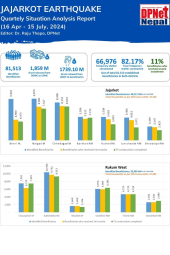Jajarkot EQ Situation Analysis Report, July 15
Summary
Eight months after the earthquake, 89% of affected households in Jajarkot and Rukum West are still awaiting the second installment of the Temporary Housing Construction Grant. Out of 81,513 beneficiaries, only 9,078 have received the second installment. The delay, attributed to rigorous documentation requirements, has left many in precarious conditions. The urgency to streamline the grant distribution process is important to prevent further financial and humanitarian crises. On July 15, 2023, a devastating flood in Aathbiskot Municipality, Rukum West, impacted temporary shelters. The flood claimed the lives of three children and injured several others. Ongoing recovery efforts must focus on preventing such future tragedies. The delay in releasing the second installment of the earthquake grants has forced many families into hard labor. Men are reluctant to engage in low-paying jobs, leading women and children to work in stone quarries to repay debts incurred from building temporary shelters and household expenses. This situation highlights the need for swift grant distribution to alleviate economic hardships and prevent exploitation.
Temporary shelters constructed in earthquake-affected areas have proven inadequate, with poor ventilation and harsh living conditions. These shelters exacerbate health problems and stress among residents, emphasizing the need for better planning and construction standards in future recovery efforts. A powerful storm on April 2 caused severe damage to temporary shelters in Jajarkot and Rukum West. The storm highlighted the fragility of these shelters and the urgent need for resilient reconstruction. The loss of educational facilities and agricultural damage further complicates the recovery efforts in the earthquake affected area. Twenty-eight settlements in Jajarkot and Rukum West are at high risk of landslides and floods during the monsoon season. Urgent relocation and long-term risk mitigation strategies are necessary to protect these vulnerable communities. The government's deployment of specialized teams to aid in relocation and disaster preparedness is a crucial step in addressing these risks. The government has relocated 13 families from high-risk landslide areas in Jajarkot.
Immediate measures have been taken, long-term solutions are essential for sustainable safety. Comprehensive land and water management strategies are needed to address the underlying issues caused by the earthquake. Junichade Rural Municipality in Jajarkot is facing a severe food crisis due to transportation difficulties. The lack of infrastructure has hindered the delivery of essential food supplies, exacerbating the economic downturn and pushing more families into poverty and hunger. Urgent construction and maintenance of transportation infrastructure are necessary to ensure food security. Water shortages and inadequate WASH facilities in Jajarkot and Rukum West have increased health risks, particularly for vulnerable populations. The reconstruction efforts must prioritize resilient WASH facilities to ensure basic hygiene and access to clean water, crucial for disease prevention and long-term recovery.
Despite widespread migration trends, Jajarkot and Rukum West have shown positive population growth rates. The unique socio-economic factors in these regions provide valuable insights into sustainable rural living models. Future recovery programs must consider these aspects to support the growing population in both districts. The historic Jajarkot Durbar, damaged by the earthquake, has been covered to prevent further monsoon damage. The preservation of this cultural landmark is vital for maintaining Nepal's rich history and heritage. A field visit by DPNet team to various districts highlighted the lack of coordination among NGOs and government agencies, leading to uneven aid distribution. Enhanced disaster preparedness and response strategies are needed, including resilient infrastructure, livelihood programs, and improved WASH facilities. The visit highlighted the importance of swift grant disbursement and effective coordination to support recovering communities.
Categories:
DPNet Publication
Published Year:
2024
